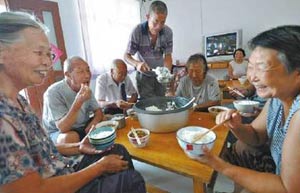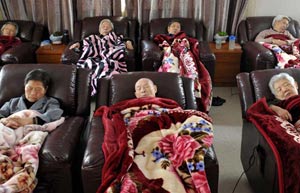In-home nursing gains popularity in aging China
(Xinhua) Updated: 2014-03-14 11:29
|
 |
|
Two senior citizens eat at a restaurant in Lanzhou, Gansu province, in 2012. They ordered their meals through a virtual nursing home, which offers discount prices to elderly people.[Pei Qiang/ for China Daily] |
TIANJIN - In-home nursing is emerging as a new choice in easing the pressure of China's aging population.
This week, the Chengguan District Virtual Nursing Home in Lanzhou city of northwest China's Gansu province announced that it will incorporate more healthcare options as the services of this in-home care agency enjoy growing popularity.
According to local government data, by the end of 2012, more than 220,000 seniors had accessed the services of the agency since it began operating in 2009.
In-home care agencies, also dubbed "virtual nursing homes," guarantee similar services as brick-and-mortar nursing homes. But they are delivered directly to people's addresses instead of in residential nursing facilities, which are generally very crowded.
The trend is taking on prominence as China grays more rapidly and conventional homes for the elderly face a shortfall in resources.
China now has a staggering 200 million people aged 60 and over. The number accounts for 14 percent of the total population, and is expected to surge to 400 million in 2050.
But the country had a mere 40,000 nursing homes by the end of 2013. With less than 3.9 million beds available in those facilities, pressure from the glut is overwhelming.
It is in this context that virtual nursing homes have sprung up in provinces including Jiangsu, Gansu, Hunan and Anhui, offering convenience and slashed demand on resources. The first opened in Suzhou in east China's Jiangsu province in 2007.
 |
 |
| China to insure elderly homes |
- NHTSA says finds no 'defect trend' in Tesla Model S sedans
- WTO rare earth ruling is unfair
- Amway says 2014 China sales may grow 8%
- President Xi in Europe: Forging deals, boosting business
- CNOOC releases 2013 sustainability report
- Local production by Chery Jaguar Land Rover this year
- Car lovers test their need for speed in BMW Mission 3
- China stocks close mixed Monday

















